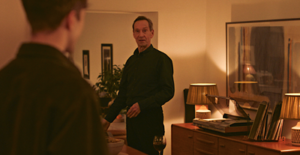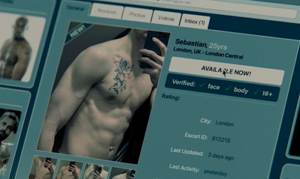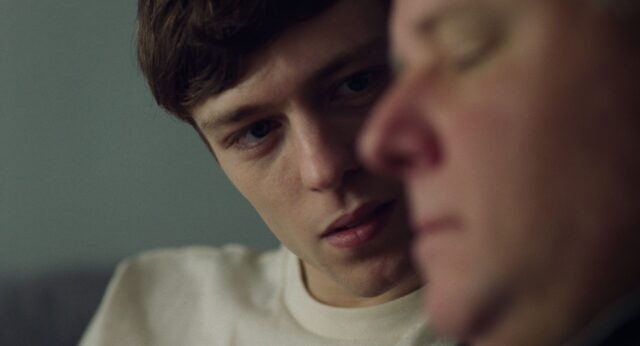By Robert St. Martin
(The Hollywood Times) 8/10/24 – After its debut at Sundance, Mikko Mäkelä’s film Sebastian (UK/Finland/Belgium, 2024) has found its way to San Francisco’s Frameline Film Festival where it screened on June 24 at the Vogue Theatre. The center of this much-awaited film is Max (Ruaridh Mollica), a 25-year-old aspiring writer living in London. He works as a freelancer for a magazine to pay the bills and gain writing credits, while he continues to work on the short stories that he’s become known for and published in Granta. However, Max’s passions rest in his debut novel about a gay sex worker’s experience, which he’s secretly writing from his own personal firsthand encounters working in the trade under the name Sebastian.

In order to have fodder for his novel, Max Williamson has decided to live out the experiences of a contemporary sex worker through his creation, Sebastian, although he tells his writing class and publisher his research consists of interviews with sex workers. As he spends more time with his clients, he gains experiences like group sex and an unexpected connection with an older gay man named Nicholas (a deeply affecting Jonathan Hyde), but his double life begins to take its toll.

Max as a writer, is barely developed outside of his obsession with the highly successful writer Bret Easton Ellis, who burst on the literary scene with Less than Zero in 1985. Other than scenes of him writing verbatim from his sex work experiences, we don’t know much about Max’s process or what wants to say about the world. There’s some lip service about how contemporary sex workers view their jobs today, but little sense of the weight of queer history or politics in the U.K. Mikko Mäkelä’s Sebastian lands striking commentary on many dualities of sex work, as well as the deconstruction of tropes within LGBTQ storytelling. It’s far from subtle and suffers from lack of depth in the creation of the character of Max.

Mäkelä’s screenplay splits Max’s life into two parts, clearly delineated by the name change from Max to Sebastian, utilizing a Rentboy.com-esque platform to meet with clients primarily composed of older men. He’s not particularly comfortable in his skin, as his gaze in the gym and other profiles compare his body to those around him. Sebastian is a relatively new identity, as Max continues to push himself out of his comfort zone through his sessions with clients.
Writer-director Mikko Mäkelä clearly understands how difficult it is to succeed in London and how hard anyone must work to achieve anything there as a writer. By choosing a handsome young white man as the hero “Sebastian” is clearly playing on the easiest setting. Society has thoroughly changed in the last 40 years, and today young people can now be open about their sexuality without anyone much caring. Max as a writer could just have been focused on a gay young man’s search for love, but he has chosen to push this to include gay sex work as a titillating topic albeit more limited in its readerly appeal.

Max’s nom-de-sex-work is Sebastian, used on an app where he refuses to post face pics but is still able to find as many punters as he pleases thanks to the rest of him. The sex is graphic, though (with one brief exception) not pornographic, and through his contact with the punters – almost exclusively wealthy older men who also provide the drugs for free – Max is learning a great deal about himself. He is also turning those encounters into his first novel, “Sebastian,” which he constantly claims to his agent, Dionne (Leanne Best), and his best friend, Amna (Hiftu Quasem), is based on interviews with students who turned to sex work to pay for their education.

Everyone comments on how his novel feels like it’s coming from personal experience, which Max allows his female supporters like Amna (also a writer) to credit to his enormous talent. When Max is writing down his experiences, he says that this is the only time that he is happy. But that pleasurable pull of finding new experiences to fictionalize begins to threaten Max’s career at the magazine, where he’s hoping to be chosen to write a major profile of Bret Easton Ellis (whose participation here is another kind of meta-commentary). Max’s editor, Claudia (Lara Rossi), makes some very sharp points about the current need to emphasize sensitivity for the readers along with the own-voice sensibility of the writers.
The device of the ongoing deconstruction of Max’s writing is clever meta-critique of the plot of “Sebastian,” in which this young man with such obvious talent decides to risk it all by delving into sex work. Gay sex work, no less. It’s a tremendous high wire act; and it’s a testament to the bravery and skill of everyone involved that the movie succeeds completely.

Actor Ruaridh Mollica is terrific as Max, capturing the character’s deep-rooted insecurities and reclamation of his life. The sexual frankness shown by director Mäkelä’ bolsters the lead character’s journey. His perception and definition of sex changes over the course of his experiences, ranging from sensual to discomforting. Mäkelä doesn’t shy away from putting sexuality front and center, allowing these scenes to act as natural as any dialogue-based exposition. Mäkelä walks the line of the story’s tropes with mixed results, but he instills a surprising tenderness and sympathy for some of the characters.





